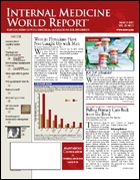Publication
Article
Internal Medicine World Report
Top 9 Reasons why Diets Don't Work, and how you can Begin to Lose Weight
There's a good reason most diets don't work, according to nutritional coach and weight-loss expert Deborah Arneson, BS, MS, LCN.
Most people do them wrong! Having helped hundreds of clients achieve their goal weight for the first time, Ms. Arneson cites the top 9 diet bloopers that prevent people from losing weight, and what you can do about it:
1. Poor sleep habits.?Going to bed too late and sleeping too little prohibit nightly adrenal regeneration and add toxic load in the liver, leading to slow metabolism, which promotes weight gain.
What you should do: Be asleep by 10 pm, and aim for 8 hours of sleep each night.
2. Not enough calories.?Eating less than your body's minimum daily requirement actually causes your body?to store fat rather than lose it. This feast-or-famine response kicks in the moment your daily calorie intake drops too low. ?
What you should do:?Don't starve yourself, and don't skip meals. Eat at least 1,200 calories each day.
3. Under-hydration. Drinking too little water slows down your metabolism and the body's ability to burn fat. To calculate your daily water allowance, use the following formula:
Weight (in pounds) X .075 = cups of water/day.
Interpretation: Multiply your weight (in pounds) by .075; the number you get is the number of cups of water your body needs each day to maintain good metabolism, which is the key to weight loss.
What you should do:?Drink a cup of water when you wake up, before each meal and snack, and before bed. Drink from a large bottle of water throughout the day at work. This is an easy way to hydrate adequately.
4. Exercising fewer than 25 minutes.?Exercising 25 minutes or less helps you maintain your current weight, but not lose weight or excess fat. The first 25 minutes of aerobic exercise burns glucose (sugar), but not fat. ?The exercise that counts as far as losing weight only kicks in at 26 minutes, at your target heart rate. ?
What you should do:?Do aerobic exercise, such as stationary bike or brisk walking, more than 25 minutes, 5 times a week. Even if you only do 30 minutes each time, that's 5 minutes of fat-burning, 5 times a week, or 25 minutes of pure fat-burning, weight-loss exercise.
5. Eating too little protein.?Too little protein in your daily diet slows down fat processing in the body. Use the following formula to calculate your body's daily protein requirements:
Weight in pounds ? 2 = grams of protein/day.
Interpretation: Divide your body weight (in pounds) by 2. The number you get is the number of grams of protein you need daily.
What you should do:?Figure out how much protein your body needs, and make sure you eat it every day. Eat high-quality protein, such as lean meat or poultry, fish, soy, or beans plus whole-grain?protein that does not have trans fat or saturated fat.
6. Not enough fiber.?Eating fiber helps the body burn fat, stabilize insulin, and drop pounds. Fiber is found in many fresh fruit and vegetables.
What you should do:?Eat 2-4 pieces of fresh fruit and 2-4 cups of steamed or raw vegetables daily.
7. Watching the wrong numbers.?You're looking at the wrong numbers. The important numbers you need to know for fat loss are: body-fat percentage, body-mass index, waist-to-hip ratio, and your daily calorie allowance.
What you should do:?Ditch the scale. Learn how to find these numbers, and use them correctly. A clinical nutritionist or doctor can give you a test for your body-fat percentage and these other numbers, and show you how to use them correctly.
To calculate your body mass index, click here: www.nhlbisupport.com/bmi
To calculate waist-to-hip ratio: Divide your waist circumference by your hips circumference. Ideal ratios are:
For women: less than 0.80. ?
For men: less than 0.95.
Example: waist = 26 inches; hip = 30 inches: 26:30 = 0.87.
Or click here: www.ahealthyme.com/WaistHip.do
To calculate your daily calorie allowance, multiply your current weight X 12 hours of active living. This is the amount you can eat each day and not gain weight.
8. Ignoring the clock.?Not paying attention to the time of day or how often you eat is detrimental to weight loss. Eating late at night promotes weight gain.
What you should do: Don't eat after 7 pm. An easy way to lose weight is to eat small meals, eat soon after rising, and then every 2-3 hours.
9. Not budgeting calories. Most dieters are clueless about how many calories they consume in a day. What you should do:?Once you calculate your daily calorie allowance, budget for 500 calories fewer than that, if you want to lose 1-2 pounds per week.
FOR MORE INFORMATION: Ms. Arneson offers wellness programs and interactive health seminars for corporations nationwide, does nutritional counseling at her Healing Quest Center (visit www.healingquestcenter.com), is producer of Chicago's Health Quest consumer health TV show, and has penned the new book, Fries, Thighs, and Lies: The Girlfriend's Guide to Getting the Skinny on Fat?(Basic Health, $14.95).






